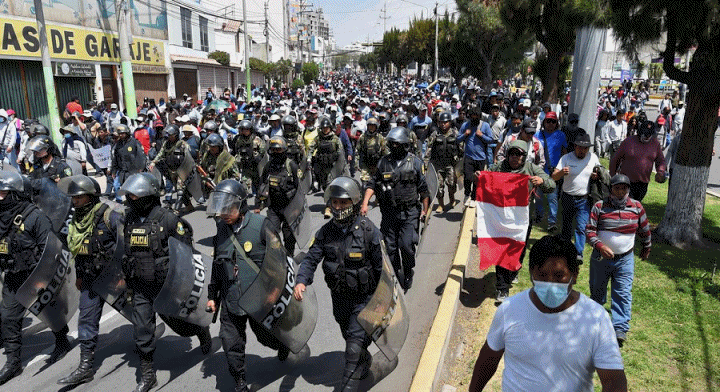PERU FACING A SERIOUS POLITICAL CRISISAND SOCIAL IN A STATE OF EMERGENCY | |
Thousands of Peruvians are preparing to converge on Lima on Monday, January 16, to demand the resignation of President Dina Boluarte, despite the state of emergency declared on Saturday in the Peruvian capital and three other regions. Sunday evening, dozens of demonstrators, framed by a large police force, marched peacefully from the city center to the tourist district of Miraflores, in Lima, to cries of "Dina filth, down with the dictatorship" or "Dina, corrupt murder! ". In addition to the departure of the Head of State, the demonstrators demand the immediate holding of elections and the dissolution of Parliament. They want to reach Lima to give more weight to their claims. In the rest of the Andean country, the blockages, which began in mid-December, continue. The clashes between police and demonstrators have already left at least 42 dead. State of emergency declared in several cities The government therefore declared a state of emergency on Saturday January 14 in the capital Lima and several other regions to try to put an end to the demonstrations which have shaken the country since the dismissal of former President Pedro Castillo. This measure, which had already been decreed in mid-December throughout the country, will be in force for 30 days. It authorizes the army to intervene to maintain order and leads to the suspension of several constitutional rights such as freedom of movement and assembly and the inviolability of the home, according to a decree published Saturday evening in the official journal. In addition to the capital, the departments of Cuzco and Puno (south) are notably subject to a state of emergency, as is the port of Callao, next to Lima. Dina Boluarte, the "traitor" The protests erupted after the dismissal and arrest on December 7 of socialist President Pedro Castillo, accused of having tried to carry out a coup d'etat by wanting to dissolve the Parliament which was preparing to oust him from power. Dina Boluarte, who was Pedro Castillo's vice-president, succeeded him in accordance with the Constitution and came from the same left-wing party as him. But the demonstrators, who see her as a "traitor", demand her departure as well as immediate elections. Dina Boluarte refuses to resign. “We hope that this situation will change radically and that the path of dialogue will be restored,” the president of the Peruvian Council of Ministers, Alberto Otarola, told the Latina television channel. He also reaffirmed that Dina Boluarte “will not resign”. “Out of a sense of historical responsibility and because the resignation of Dina Boluarte would open the door to anarchy. It would be irresponsible for Madame Boluarte to leave when the country is going through these problems. » Early elections in 2024 In mid-December, Dina Boluarte announced that she wanted to advance the elections to 2024. “No life deserves to be sacrificed for political interests. I reiterate my call for dialogue and the renunciation of violence, “had launched the Peruvian president on Twitter, the day after deadly demonstrations which took place in Andahuaylas, 750 km from Lima. "I have decided to take the initiative for an agreement (...) to advance the general elections to April 2024", instead of 2026, she added, in a televised message to the nation, for try to calm the demonstrators. An investigation opened against the president In Peru, an investigation for "genocide, qualified homicide and serious injuries" was opened by the Attorney General of the State, Wednesday, January 11, against President Dina Boluarte and several senior officials, after a bloody repression of demonstrations demanding the organization of early elections. The State Prosecutor, Patricia Benavides, took the decision "to open a preliminary investigation against the President, Dina Boluarte, the President of the Council of Ministers, Alberto Otarola, the Minister of the Interior, Victor Rojas, the Minister of Defense, Jorge Chavez, "announced the prosecution. This investigation concerns acts of "genocide, qualified homicide and serious injuries, committed during the demonstrations of December 2022 and January 2023 in the regions of Apurimac, La Libertad, Punon, Junin, Arequipa and Ayacucho", he said. he adds. Yet another twist in the serious crisis that the Andean country has been going through for several years, which has reached its climax since the dismissal of Pedro Castillo on December 7. The former president, candidate of a left-wing coalition elected in 2021, is accused of rebellion, after having tried to dissolve the Parliament which sought to oust him from power. He was kept in detention for 18 months by a decision of the Peruvian Supreme Court on December 15. Prosecuted for "rebellion" and "conspiracy", the ex-president faces ten years in prison, according to prosecutor Alcides Diaz. "The conflict risks getting bogged down", according to a specialist “I fear that a point of no return has been reached, worries Camille Boutron, researcher at the Institute for Strategic Research of the Military School (Irsem) and specialist in Peru. The opening of the investigation by the Attorney General for homicide certainly testifies to a form of judicial independence, but the conflict risks getting bogged down, especially after such a deployment of violence. It's going to be very difficult to calm things down." In fact, the situation is explosive in Peru, where the demonstrators are demanding both the dismissal of the president, who nevertheless comes from the same Marxist political party as her predecessor, the organization of early elections and the drafting of a new Constitution. Difficult demands to meet for President Dina Boluarte, faced with a Parliament refusing to dissolve, a climate of tension complicating the organization of a new election, and the political and institutional slump in which Peru has been mired for years . An ungovernable country with five heads of state in six years For 32 years, in fact, all Peruvian presidents, with the exception of two of them, have been imprisoned or indicted for corruption. The country has had no less than five different heads of state in the past six years, and the successive leaders between 2001 and 2018 have all been corrupted by the Brazilian construction company Odebrecht. We are in a cycle of extremely serious political and institutional instability. Former President Pedro Castillo proved unable to govern during his year and a half in office. More than 80 ministers succeeded each other under his government, faced with the systematic blocking of a Parliament dominated by a right-wing opposition embodied by the daughter of the former president Fujimori (1990-2000), convicted of crimes against humanity. A "game of massacre" between elites, which has been going on for years and prevents the implementation of structural reforms, however urgent. A society plagued by deep divisions Peruvian society is indeed plagued by strong social and racial inequalities and deep divisions inherited from the colonial era and the civil war (1980-2000), accentuated by the violence of the Covid-19 epidemic. What explain the exasperation of the population, confronted with the decadence of its political class. This feeling is aggravated by the absence of political parties, civil society organizations or trade union structures capable of bringing about a dialogue between the population and its leaders. "There is no possibility of intermediation between the expectations of the population and its rulers,” laments Jean-Jacques Kourliandsky, director of the Latin American Observatory of the Jean-Jaurès Foundation. "Voters only have the street to express themselves. I don't know how things will evolve." "Peru has been completely ungovernable for years", analyzes Jean-Jacques Kourliandsky and associate researcher at the Institute of International and Strategic Relations (Iris). |
|
| Samantha Moore for DayNewsWorld | |
 |
|




